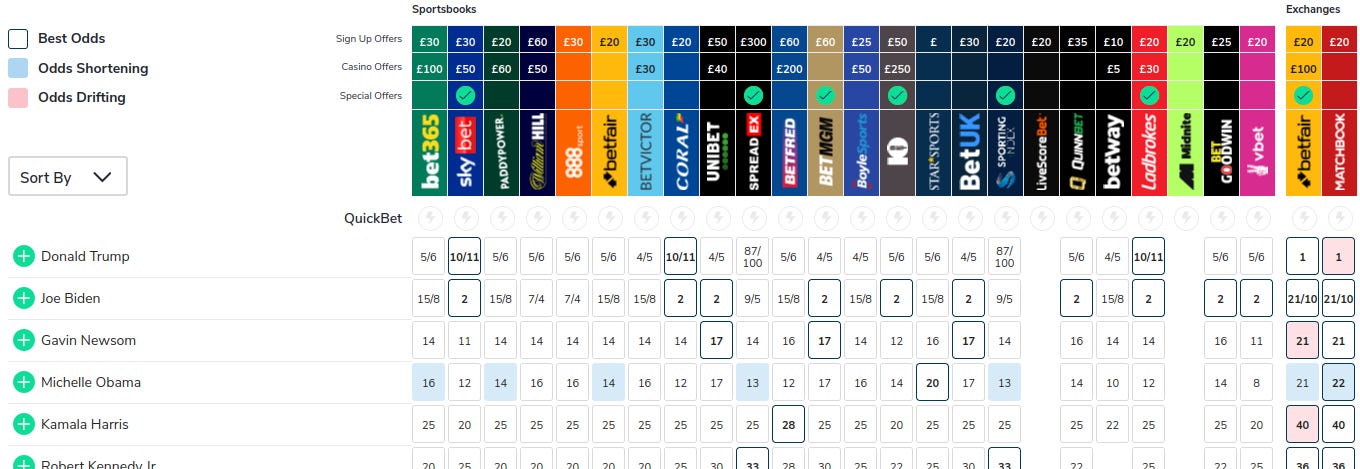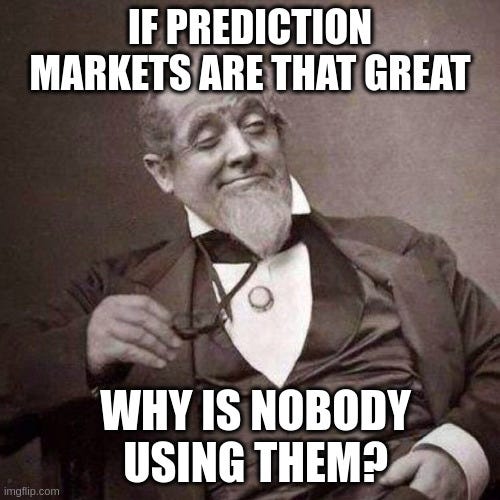Why is nobody using prediction markets if they are so great?
"It interferes with our ability to shape the narrative," he said. That isn't the only reason though.
While I argued that prediction market are rarely useful for me as a rather normal person, they are useful for many things. For example, to manage projects or monetary policy.
Prediction markets are the most accurate forecasting tool, because if it isn’t the case then someone can earn a lot of money until it is. Since there will always be some greedy clever human, it seems inevitable that prediction markets will become the most accurate.
That begs the question, why is hardly anybody using prediction markets?
First, how would success actually look like?
Ultimately, the purpose of prediction markets is better decision making. That activity is useful everywhere. It covers decisions which have an impact of billions and trillions of dollars. If prediction markets could improve that just by a few percent, we are talking about billions of dollars at stake.
Financial markets are prediction markets. A stock price forecasts the future cash flow of a company. Even more obvious are futures contracts. Prediction markets in general would just be about much more topics. Success would mean that hedge funds bet billions on the outcomes of policy decisions, elections, science, wars, economics, etc. They already do actually, but only in indirect ways and that means the forecasts are hardly visible or usable.
The project director of Metaculus, Tom Liptay, said in a podcast “In our ideal world, we would be read at the White House.” Prediction markets make the forecasts visible and usable unlike the current financial markets. Politicians and journalists would debate about these markets.
That would only be public prediction markets though. They can also be used internally by organizations. In fact, many companies tried internal prediction markets but so far all seem to have abandoned them.
Prediction markets like Polymarket are tiny compared to their potential. The money involved there and the attention they receive should be 1000x. That would be success.
So … why not?
Regulation
Without doubt the tight regulations in the US constraint prediction markets. US citizens are not allowed to participate in Polymarket. Manifold is just play money. Metaculus is not a market. Kalshi and PredictIt limit how much participants can invest. Overall, liquidity is severely constricted and thus accuracy is not as good as it could be.
One group lobbying against prediction markets is Better Markets. Their concerns are threefold:
The law says “gaming” is forbidden.
It incentives anti-democratic activities and threatens the electoral process.
It gamifies finance.
A longer version is found in their letter to the CFTC last year about Kalshi. To be honest, I don’t see any evidence supporting theirs fears. The argument about the current law seems to be correct, so the law should be changed.
That is only the US though. For example, the UK has a much more liberal culture if you look at sports betting. There are plenty of gambling sites available.

Still, I don’t see such odds mentioned often in political discussions. The gambling sites certainly don’t emphasize the forecasting capability. Instead, it’s about fun. That means only superficial and short-term questions are considered. No CoViD-19 origins or Ukraine war gambling, for example. Unfortunately, the interesting questions are complex and require effort. So why should anybody bet in such markets? The director of Swift Centre and superforecaster, Michael Story said in podcast “You open a market on that, they're just dead. Nobody cares. No one wants to participate in that because it's not fun...”
Well, it is fun for some geeks but that isn’t enough. What makes people do things that are no fun? Money helps but regulation prevents that. What else could work?
Reputation
Good Judgement and Metaculus essentially run on reputation from the forecaster’s point of view. The title “superforecaster” demonstrates some qualification.
There is another group of people who are proud of their judgement: Executives and managers. For these people, forecasters bring data but mere data is not enough to make good decisions. Within the forecasting community, the opinion is rather cynical, like this one:
Prediction markets threaten the hierarchical control of top managers. It would become too obvious that most managers are idiots, unable to predict the future.
From the book Superforecasting:
Bob in the CEO suite does not want to hear, much less let others hear, that Dave in the mail room is better at forecasting the company's business trends than he is.
Forecasting is a humbling experience. Like stock trading, most people are overconfident and not that good. That can be embarrassing. The best forecasters today all seem to have a high tolerance to embarrassment.
Most people don’t like forecasting, and the people who sign up for forecasting sites like GJOpen and Metaculus are unusual. –Michael Story
Ruling
Then there are more “pragmatic” reasons. Robin Hanson collected some quotes:
A G7 government official and advisor to their head of state:
The prediction market experiment was a success, but we will not proceed with the programme as it interferes with our ability to shape the narrative around the direction of government policy.
A leading bank CEO:
“Your crowdsourced real-time risk radar is remarkable, but we will not use it here. The only person who tells my board about unexploded bombs in this bank is me and people who answer directly to me.”
For some people prediction markets are a threat. They consider their role to be about control and power. They make the final judgement call and this is why they are entitled to big salaries.
On the other hand, “data-driven company” is a popular buzzword. Ultimately, it means to transfer control from people to processes. Often algorithms, but it could also be socioeconomic processes, where people are involved. Processes like prediction markets. Democratic elections are another example. Futarchy would be the most extreme form where prediction markets take over parts of the government or the board of management.
Will that be a good or a bad thing? I don’t know since nobody really tried and it depends on a lot of details. If we ever do, it will be a complex system and its emergent behavior can hardly be predicted. Ironic.

Regulation. Reputation. Ruling.
These are the three enemies. Three forces actively working against the success of prediction markets.
(At first, I called it “control” instead of “ruling” but everybody likes alliterations.)
They are powerful but beatable. Regulations are changed all the time. Rulers are changed all the time. Reputation can be gained in other ways as well.
I would love to get more feedback on this newsletter. Give it anonymously via admonymous. Thanks to
for the idea.Probably until next week, successful readers! 😊






My understanding of the reason the CFTC has ruled against election markets in the US is the fact that it would make candidates the equivalent to a security and everyone working for the candidate who has insider knowledge on the state of the election has an unfair advantage over those not involved in an insider capacity. Therefore, before these markets can exists, the CFTC would need to have processes and protocols in place to guard against insider trading the same way they do with financial firms that are required to preserve all communications for a certain amount of time in the event a suspicious transaction needs to be investigated.
I am not sure I like the idea of a government agency monitoring all of the communications of political campaigns just so people can speculatively gamble on the outcome. But why not let us bet on things like Chinese political dynamics? Like we barely have any information at all about that extremely complex and closed system and it seems very unlikely anyone is going to be getting leaked insider information.